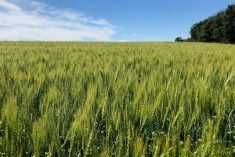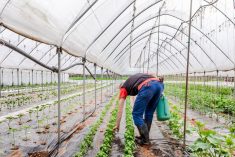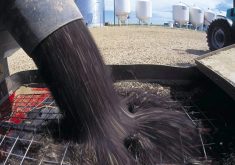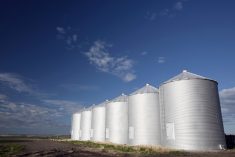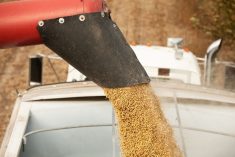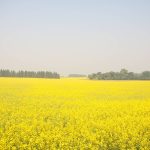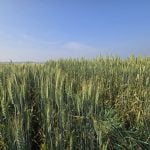COVID-19 threatens to sideline Agriculture and Agri-Food Canada’s (AAFC) field, greenhouse and laboratory research this year, but not if the Prairie wheat and barley commissions that help to fund it with farmer money have a say.
AAFC has been sending “mixed messages” about its plans, Pam de Rocquigny, general manager of the Manitoba Wheat and Barley Growers Association, said in an interview Saturday.
Her association, along with cereal grower commissions in Saskatchewan and Alberta, haven’t given up hope that some of AAFC’s more important research projects will go ahead on a case-by-case, region-by-region basis, and is urging AAFC to find ways to make it happen.
Read Also

India slaps 30 per cent import duty on yellow peas
India has imposed a 30 per cent duty on yellow pea imports with a bill of lading date on or after Nov. 1, 2025.
“They (AAFC) haven’t come out and said extremely black and white, it’s not happening,” she said.
A statement Friday from AAFC seems to all but rule out field work this spring, but leaves the door open a crack.
Why it matters: Prairie farmers rely on improved crop varieties to keep them competitive. Most of that research and plant breeding is done by Agriculture and Agri-Food Canada, with some farmer funding through checkoffs collected by the Prairie wheat and barley commissions. No AAFC research this season means farmers will wait longer for new varieties. It could also disrupt researchers who collaborate with AAFC.
“In response to public health orders, AAFC research centres scaled their operations to critical services only,” the department’s statement said.
“These actions do not allow, at this time, for field-based research projects that require physical presence in our fields or laboratory facilities, nor non-field research in laboratories and greenhouses to be conducted. We recognize that the situation is evolving quickly and at different paces across the country.
“We fully appreciate that the window for planting varies across the country, and is already upon us in some areas. We are cognizant of the impacts of a reduced field season and are working to minimize long-term impacts. We also recognize that projects are unique in their requirements.
“As such, AAFC is developing and updating various plans and strategies on how we will resume research activities when restrictions are lifted or reduced across the country. AAFC is monitoring the situation closely and is committed to working with our collaborators as we explore how and when we can initiate further science activities.”
de Rocquigny wants a clearer answer.
“There has been some work done behind the scenes to see what work could be done,” she said. “So we’ve been pressuring them to say what the drop-dead date for those decisions to be made. ‘At this time’ means right now, but they’ve also said they are assessing things so we’re unclear as to whether the decision has been made.
“In talking with them, there seems there still might be a window. When they say ‘at this time’ is totally different than them saying ‘we’ve pulled the pin on the 2020.’
“When things are not 100 per cent clear they are open to interpretation, assumptions.”
AAFC says it wants to keep employees safe during the COVID-19 pandemic. Safety needs to be paramount, but university and private company crop researchers have found a way to protect staff and continue some of their work, de Rocquigny said.
“Why can’t they?”
AAFC says it it has recently decided to “steward” its land and resources.
It will also provide some critical, time-sensitive services to the agricultural sector, including:
- Distribution of breeder seed to seed producers, and the mitigation of pest infestation on AAFC land to protect adjacent property.
- Protect the long-term integrity of science assets through genetic material, land, orchard and vineyard stewardship, including seeding with crops, applying fertilizer, pruning and spraying vineyards and maintaining long-term — greater than five-year — crop rotations.
- Protect research infrastructure such as irrigation systems or major scientific equipment.
“We recognize that the situation is evolving quickly and at different paces across the country,” AAFC’s statement said. “In terms of the planting season, approximately 20 per cent of the department’s research projects are dependent on spring planting.”
“It’s not 100 per cent clear that there’s no field season,” de Rocquigny said. “They are saying things are evolving and things could change. They need to say one way or the other in very clear terms if it is not happening.”
If AAFC doesn’t clarify soon, it will be too late to prepare plots and seed anyway, de Rocquigny said. “We don’t want that to happen either.”
If AAFC doesn’t go to the field, or its research is significantly reduced, it raises questions, including whether multi-year research agreements with the farmer commissions will be extended.
“If there is no field season then we start to tackle those financial questions,” de Rocquigny said in an interview Thursday.
“We want a timeline. What is the drop-dead date? I don’t know if they know that, or if they do they haven’t shared it.”
— Allan Dawson reports for the Manitoba Co-operator from Miami, Man.
AAFC’s statement on 2020 field research due to COVID-19
The health and safety of our employees, and all Canadians, is the primary consideration in the Department’s decision-making with respect to science-related activities.
In response to public health orders, AAFC research centres scaled their operations to critical services only. More recently, the department has implemented additional actions in order to steward our land and resources in this context. We are also providing some critical time-sensitive services to the agricultural sector. These activities include:
- Distribution of breeder seed to seed producers, and the mitigation of pest infestation on AAFC land to protect adjacent property;
- Protecting the long-term integrity of science assets through genetic material, land, orchard and vineyard stewardship (i.e. seeding with crops, applying fertilizer, pruning and spraying vineyards and maintaining long-term — greater than five year —crop rotations); and
- Protecting research infrastructure (i.e. irrigation systems or major scientific equipment).
These actions do not allow, at this time, for field-based research projects that require physical presence in our fields or laboratory facilities, nor non-field research in laboratories and greenhouses to be conducted. We recognize that the situation is evolving quickly and at different paces across the country. In terms of the planting season, approximately 20 per cent of the department’s research projects are dependent on spring planting.
We fully appreciate that the window for planting varies across the country, and is already upon us in some areas.
We are cognizant of the impacts of a reduced field season and are working to minimize long-term impacts. We also recognize that projects are unique in their requirements. As such, AAFC is developing and updating various plans and strategies on how we will resume research activities when restrictions are lifted or reduced across the country.
AAFC is monitoring the situation closely and is committed to working with our collaborators as we explore how and when we can initiate further science activities.





